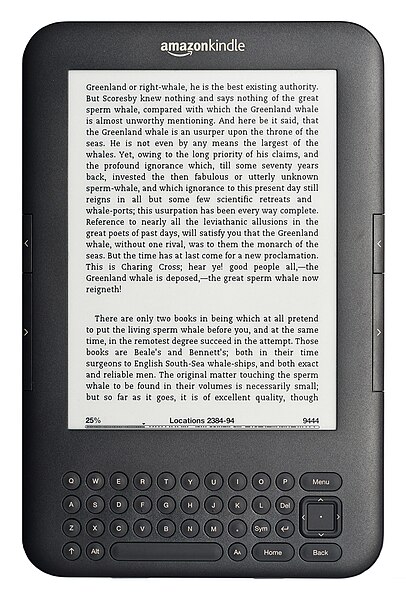Over at I Saw Lightning Fall, our friend Loren Eaton links to a Wall Street Journal article by Joshua Fruhlinger, in which he explains why he gave up on e-book readers and went back to dead tree tomes.
I BROKE UP WITH E-BOOKS last year after a flight from Los Angeles to New York. My first-generation Kindle and I had been together for five years, but I knew we’d have to go our separate ways when, an hour into the journey, it completely shut me out. Or rather, it shut down. I’d forgotten to charge the device before I left.
Upon arrival in New York, I coolly walked into a bookstore and bought a paperback version of the book my Kindle wouldn’t let me read in the air. It felt good to be back on paper, turning real pages. I realized then: E-readers are needy, but a paperback will always be there for you.
Here I find myself in the awkward and almost existentially self-contradictory position of being on the side of progress as over against tradition. Before I owned a Kindle I had all the standard Luddite objections—I loved the smell and feel of books¹, I did not want to be dependent on an electronic device that might fail or get damaged at any time, and by thunder, paper books were good enough for my grandmother, and they’re good enough for me!
But as you know if you’ve been following this blog, those objections evaporated as soon as Hunter Baker (author of Political Thought: A Student’s Guide) gave me a Kindle 3 in a random act of kindness. I very shortly made some surprising discoveries.
The most surprising was that I don’t love the feel and smell of paper books nearly as much as I thought I did. In fact I’m able now to admit my secret shame for many years—that I’ve always had trouble holding books open (I’m not a breaker of spines), and had found it somewhat tiring, in long reading sessions, to hold a book open at a convenient angle. An e-book doesn’t have a facing page to curl back, and its lightness makes it ideal for reading in comfortable situations, like when I’m stretched out on the couch. For ease of use, the Kindle has paper books beat in almost every situation.
(My main complaint is with maps. I’m someone who likes to refer often to maps in books when they’re available, and no programming has yet been introduced, at least on the Kindle, which would allow you to jump to the map and back to your place again without bookmarking the page.)
But for me, the convenience of having a whole bookshelf I can take with me anywhere (I suppose it would be a problem if I spent a lot of time in places where electricity is not available, but I make it a point never to do that) far outweighs the problems of recharging and physical vulnerability (a good padded cover is highly recommended).
Still, I am not dogmatic on the subject. You wood-pulp addicts will be graciously permitted to continue your forest-ravaging, Gaia-offending habits.
For the time being.
¹I once mentioned to my old publisher, the late Jim Baen, that a reader had commented on the delightful odor of paperback books. Jim replied, “Recycled ink made from cooking oil, redolent of French fries.”


Here I find myself in the awkward and almost existentially self-contradictory position of being on the side of progress as over against tradition.
I think this should go up as the header for BwB for a while.
Actually, I find myself facing an inverse sort of irony: I’m not a Luddite at all, but e-books just haven’t grabbed me. I read them on my phone when I travel, because having tons of tomes in the palm of your hand is useful. But chronic dry eyes make reading off a screen really difficult for me.
I frequently forget to take my cell phone with me when I leave the house, but I never forget my Kindle. Like many book lovers, I resisted the Kindle for a long time, but after I was diagnosed with cancer and began treatment, Husband gave me a Kindle and it became an enormous source of comfort and companionship for me.
My ability to concentrate was quite fragile during that time, but there was always something in my Kindle for me to read and enjoy (especially old friends, like Jane Austen). Bonus points for the large print feature, so I can read in bed without my glasses.
That’s it right there. People talk as if paper books were easy and e-books fussy and complicated, but it’s way more complex than that.
I was given a Kindle Touch for Christmas last year, and I didn’t even open it for several months. However, eventually I did, and at first I found it to be mildly pleasant.
Then I discovered that I could download the entire body of Aristotle’s works for $1.99, and carry it around with me in a searchable form forever. And many of my favorite works — Sir Thomas Malory, Chretien de Troyes, Sir Walter Scott, and others — were available for free. I could have them all with me, no matter where I went, in a form that fits in my back pocket.
As a consequence I am something of a convert as well. I still have tons of paper books around here, but I do like the ebooks very much.